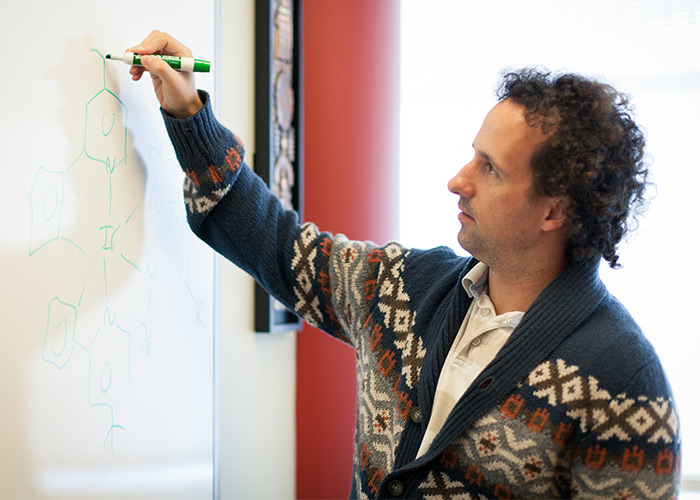Researches Phosphorescent Molecules
Thomas Teets, assistant professor of chemistry in the College of Natural Sciences and Mathematics, is the recipient of the 2017 American Chemical Society-Greater Houston Section Younger Chemist Award. This award, which recognizes contributions to education, research or service, is for ACS-GHS members under the age of 35.
 Thomas Teets, assistant professor of chemistry, received the American Chemical Society-Greater
Houston Section Younger Chemist Award.“We study the interaction of light with molecules, and the different applications
that arise from that,” said Teets, who joined University of Houston as a faculty member
in 2014.
Thomas Teets, assistant professor of chemistry, received the American Chemical Society-Greater
Houston Section Younger Chemist Award.“We study the interaction of light with molecules, and the different applications
that arise from that,” said Teets, who joined University of Houston as a faculty member
in 2014.
One focus is on synthesizing phosphorescent compounds. The major applications for these compounds are organic light-emitting diodes (OLEDs), which are used in display technologies, such as smartphones and TVs.
Teets’s research group focuses on synthesizing compounds which emit light in the deep-blue and deep-red portions of the spectrum. Compounds in the deep-red spectrum have applications in medical imaging and night-vision goggles, while deep-blue compounds are still rare.
“There aren’t many compounds that are efficient in these regions of the spectrum,”
Teets said.
In collaboration with Jiming Bao, associate professor of electrical and computer engineering,
some of these compounds synthesized by Teets’ research group are currently being tested
for possible device applications.
Meanwhile, Teets’ research group is also trying to address some of the limitations in synthesizing these compounds.
“We are trying to develop new synthetic techniques that will allow us to achieve different structures at much milder conditions,” Teets said.
One major limitation is that iridium, a metal commonly used in these compounds, is very slow to react. Synthesizing these compounds requires high temperatures, which also limits the types that can be made.
“I am very grateful to all of my colleagues and students who have worked with me,” Teets said. “I’ve had a fantastic group of students who have been the driving force for this research.”
- Rachel Fairbank, College of Natural Sciences and Mathematics